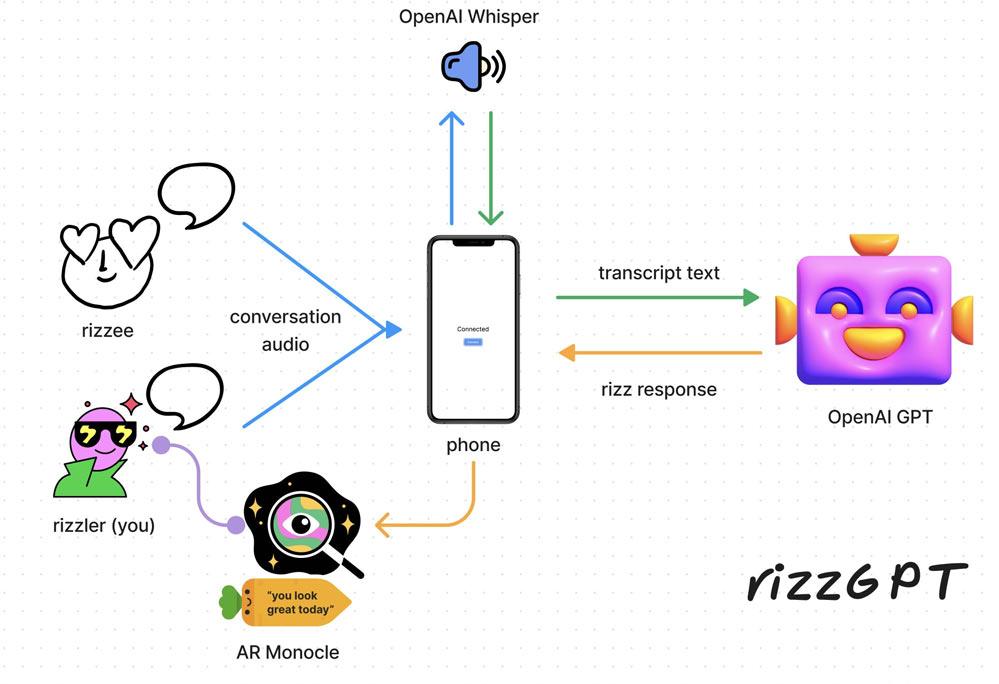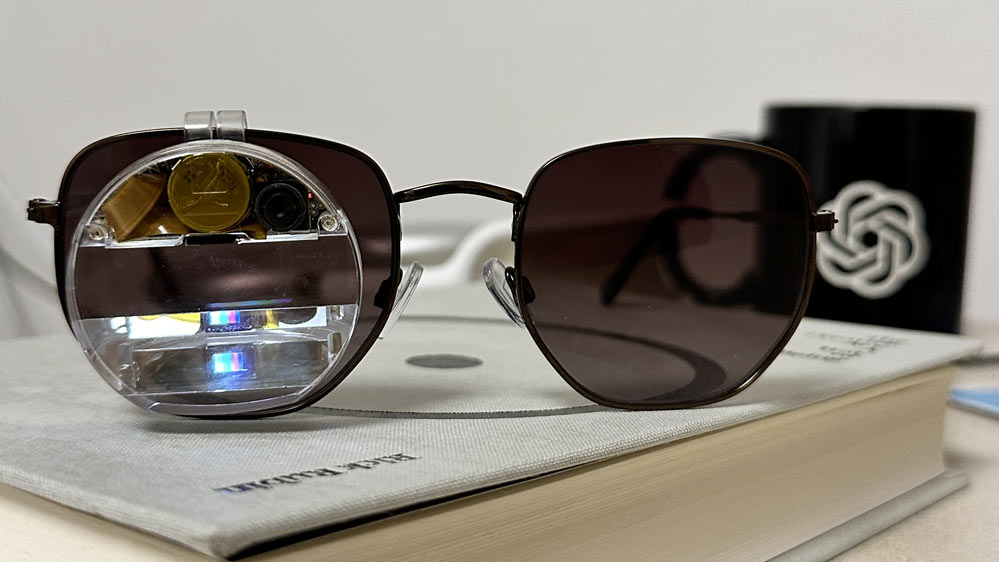ChatGPT Glasses Bring AI Into Your Real Life
rizzGPT has big glasshole energy.
While a lot of people have been having fun chatting with OpenAI’s ChatGPT, one Stanford student has found a new use for the large language model: interacting with others in the real-world.
Computer science and electrical engineering student Bryan Hau-Ping Chiang has made ChatGPT portable and interactive thanks to open source Monocle AR hardware and OpenAI’s Whisper automatic speech recognition (ASR). A smartphone is currently used within the setup, too. These combined technologies have been given the catchy name rizzGPT ("Rizz" is slang for "charisma") by Chiang. Guided in real-time, Chaing has used the AI chat assistant during events such as a mock job interview, a chance meeting with a friend, and choosing the best dishes at a new restaurant.
In a guide to rizzGPT, shared on Twitter, Chiang describes the system as the start of “a new era of ambient computing enabled by AR + AI, where everyone has their own personal assistant available 24/7.” More briefly, and humorously, rizzGPT can be used during life events like awkward dates and job interviews, providing “real-time Charisma as a Service (CaaS),” quips the Stanford student.
say goodbye to awkward dates and job interviews ☹️we made rizzGPT -- real-time Charisma as a Service (CaaS)it listens to your conversation and tells you exactly what to say next 😱built using GPT-4, Whisper and the Monocle AR glasseswith @C51Alix @varunshenoy_ pic.twitter.com/HycQGGXT6NMarch 26, 2023
A great example of rizzGPT in action is provided by the Tweet embedded above. In the video an AI-enhanced Chiang aces a set of interview questions, using the discrete Monocle AR gadget clipped to the frame of his glasses. The built-in display of the Monocle feeds him an autocue of AI-perfected answers direct from ChatGPT.
Another personal interactive situational use of the rizzGPT system is provided when Chiang bumps into a friend. The AI has learned who his friends are, trained using photos, and can recognize them. The connected Monocle wearer is able to conjure up relevant conversations based on smartphone messages exchanged with any particular friend. This could easily be deployed on "awkward dates", so wearers can autopilot a brilliant conversation. That being said, others around you may not be so thrilled to see you wearing glasses that scan their face and tell you what to say. There are some echoes of Google Glass here.
One more compelling example of AI agents combined with Monocle AR is for providing menu advice at a restaurant. In this Tweeted video you can see that the AI reads the menu (silently) for Chiang, and when verbally quizzed provides some spoken advice based on what it knows of his food likes and dislikes – and nutritional values. The Stanford student also leverages connected services for speech transcription, TTS, and OCR in this real-world AI application.
If you can think of any other fun use cases for rizzGPT, Chiang is asking for DMs, so don’t be shy to send suggestions.
Get Tom's Hardware's best news and in-depth reviews, straight to your inbox.

Mark Tyson is a news editor at Tom's Hardware. He enjoys covering the full breadth of PC tech; from business and semiconductor design to products approaching the edge of reason.
-
bit_user I figured this was where Google Glass was eventually going, but with more emphasis on visual cues. Like, it'd use face recognition to show people's names above their heads, and could give you a history of when you last talked to them and about what, in a sidebar.Reply
I even had the idea of keying off audio cues and doing google searches, to provide context. But, ChatGPT really changes the game, in conversations.
BTW, it's illegal to make audio recordings of people without appropriate warning. You can film or photograph people in public places, but not secretly make audio recordings of them. Not retaining the audio could land this in a legal grey zone, but it's not one I'd want to test in court. -
BX4096 Reply
That's not necessarily true. The legality of this varies largely from country to country. In case of the US, that depends on the state, with the majority of states allowing it, if I recall correctly.bit_user said:BTW, it's illegal to make audio recordings of people without appropriate warning. You can film or photograph people in public places, but not secretly make audio recordings of them.
EDIT: just checked, at least 37 US states allow it. The EU is different, since they have union-wide data protection regulation that prohibits it, but the rest of the countries are split. Countries like India, Sweden, or Japan allow it; countries like Canada, Australia, or the UK prohibit it. Case by case basis. -
bit_user Reply
Yes, I was talking about the US. Thanks for clarifying that. However, would you clarify which you are referring to: audio or video recording?BX4096 said:That's not necessarily true. The legality of this varies largely from country to country. In case of the US, that depends on the state, with the majority of states allowing it, if I recall correctly.
EDIT: just checked, at least 37 US states allow it. The EU is different, since they have union-wide data protection regulation that prohibits it, but the rest of the countries are split. Countries like India, Sweden, or Japan allow it; countries like Canada, Australia, or the UK prohibit it. Case by case basis. -
edzieba Replyusing the discrete Monocle AR gadget
I'm not sure whether this was merely a typo, or a deliberate pun on the device being very much not discreet and also a single display. -
PEnns Because the Google Glass was not dorky enough.. now we have the Borg Glasses.Reply
As to help with "awkward dates", dream on!! -
USAFRet Reply
Video recording in public is almost always allowed.bit_user said:Yes, I was talking about the US. Thanks for clarifying that. However, would you clarify which you are referring to: audio or video recording?
Audio recording - you often have to get permission from all parties involved.
Varies by state.


